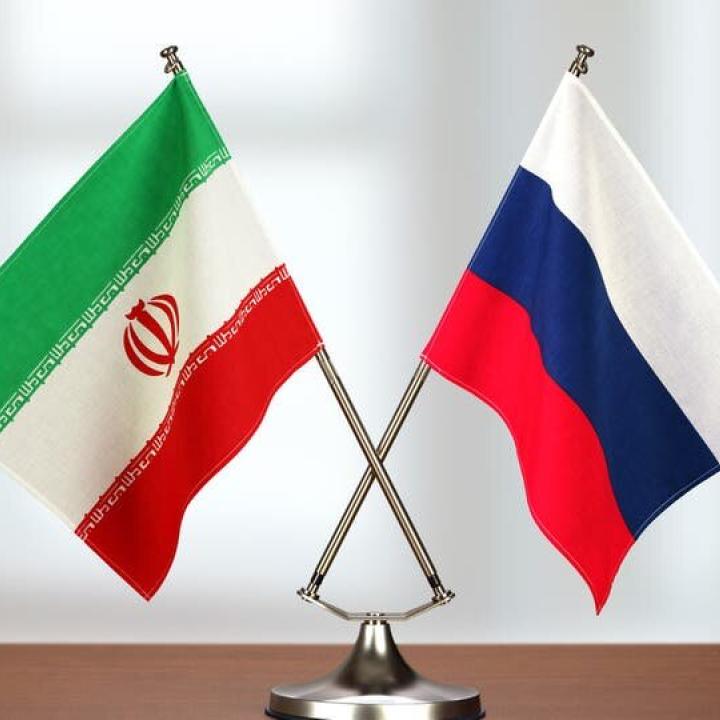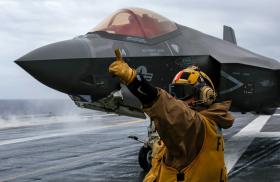
- Policy Analysis
- PolicyWatch 4085
Exploiting Fault Lines in Iran’s Relations with Russia and China After the Israel War

The Israeli and U.S. military campaigns revealed how far Moscow and Beijing are willing to go (or not go) in their support for Tehran, providing Washington with opportunities to keep Iran in a weakened position.
The Iran-Israel war and its aftermath have highlighted the limits of Tehran’s relationships with Russia and China. On one hand, they support each other diplomatically and (to a limited degree) militarily, and Iran has signed strategic partnerships with both countries. Yet neither Russia nor China intervened overtly on Tehran’s behalf in the twelve-day war, largely limiting themselves to condemning the Israeli and U.S. strikes while reaffirming their support for Iran’s self-defense.
The current arrangements between Iran and its two great power patrons arguably benefit them more than Tehran. Russia has received access to Iranian military technology in exchange for vague promises of military support, while China has received cheap Iranian oil, the sales of which provide an economic lifeline to Tehran without Beijing having to do much else. Since the war, Iranian commentators have been airing their grievances against Russia and China. At the same time, because these arrangements have so benefited both powers, they have a stake in ensuring that the Iranian regime endures and are highly likely to continue providing support. The form that this support takes will be determined by the delicate balance between Iran’s needs and broader Russian and Chinese interests in the region.
What Could Russia Do for Iran?
Moscow’s top priorities across the region remain the same as before the conflict: positioning itself as a mediator—a role the Kremlin has already signaled it is ready to take on—while simultaneously empowering anti-American forces. In this double game, Moscow wants to appear to be an indispensable great power and use this position to create leverage for itself, including for possible Western concessions in Ukraine and other theaters. It also wants to preserve good relations with all actors in the region and thus—on paper at least—would not go too far in supporting Iran. Nevertheless, if Moscow were involved in diplomatic talks on Iran, it would essentially act as Tehran’s lawyer.
Iran, for its part, seeks diplomatic support from both powers. As Foreign Ministry spokesman Esmail Baghaei recently stated, “We are in constant consultation with [Russia and China] to prevent activation of the snapback or to mitigate its consequences,” referring to the potential reactivation of UN sanctions lifted years ago under the 2015 nuclear deal.
Moscow may also go beyond diplomatic support to provide other types of assistance to Iran’s nuclear program while claiming to be a neutral arbiter. It already provides fuel to the Bushehr nuclear plant and could provide more. It could also send additional nuclear technology and expertise, covertly or overtly, and collaborate on dual-use research relevant to weaponization. Earlier this month, President Vladimir Putin met with Ali Larijani, Supreme Leader Ali Khamenei’s top nuclear advisor, to discuss the nuclear program, which Russia has supported since the mid-1990s. Moscow has also offered to help remove excess nuclear material from Iran. The Kremlin has always said that Western concerns about Iran’s nuclear program are overblown, and it is more concerned about Iran turning pro-Western than nuclear. Moreover, the two partners held joint naval drills after the Iran-Israel war, showing that whatever grievances Tehran had against Moscow for not coming to its rescue, they remain committed to each other.
What Type of Support Might China Provide?
Beijing has sought to carefully calibrate its relationship with Iran in recent years so as not to upset its growing ties with the rest of the region, particularly the Arab Gulf states. Much of the vaunted $400 billion, twenty-five-year agreement that China signed with Iran in 2021 has yet to come to fruition, partly because Beijing has shifted its economic focus to the Gulf. The Chinese-brokered 2023 agreement between Saudi Arabia and Iran fit neatly into Beijing’s larger aspirations to be viewed as an impartial arbiter of global disputes and promote a different approach to the Middle East.
Despite the shift in focus, however, the relationship with Iran has greatly benefited China. After the United States sanctioned a Chinese state-owned oil refiner in 2019, Beijing attempted to evade the restrictions by acquiring Iranian oil through an intricate network of ship-to-ship transfers and semi-independent “teapot” refineries. The net effect is continued Chinese access to below-market Iranian oil, which disproportionately benefits Beijing: roughly 90 percent of Iran’s oil exports flow to China, while Iranian oil makes up around 11 percent of China’s overall imports. Beijing also reportedly pays Iran in Chinese currency or extends credit for Iranian purchases of Chinese equipment, which also disproportionately benefits Beijing. In exchange, Iran gets a reliable, if not completely desirable, export market for its oil, as well as diplomatic support from a permanent UN Security Council member and key U.S. rival.
China has also provided tangible military support, either directly or indirectly—its firms have been sanctioned by the United States for supplying propellant material for Iran’s ballistic missiles as well as components for its drones. Iran’s proxies around the region, including the Yemeni Houthis, have also benefitted from access to Chinese components. Moreover, China’s navy regularly conducts maritime exercises with Iranian vessels when transiting the region, most recently this March. And just days before the recent U.S. strikes on Iran, several Chinese cargo planes were observed making undeclared stops in Tehran, despite listing their destination as Europe.
Any future tangible Chinese support for Iran will follow its cautious formula and will likely be clandestine, with deniability built in. While Beijing has no interest in seeing the Iranian regime collapse, it also does not want to upset its relations with Iran’s neighbors by providing overt support. For instance, Chinese officials could portray shipments of propellant for Iranian missiles as being sent from Chinese companies, not the state. And Beijing would portray any sale or transfer of military equipment—such as air defense systems—as more defensive in nature. Moreover, any further economic support would almost certainly come with conditions like those placed on China’s purchases of Iranian oil—namely, a requirement that joint projects indirectly boost the Chinese economy, not just Iran’s. Politically and diplomatically, Beijing will be more than willing to continue providing cover for Iran in international forums, as this costs it very little and fits neatly with its time-tested criticism of the United States and the West.
Recommendations
The Iran-Israel war revealed the fault lines in Tehran’s relations with Russia and China, and the United States should exploit these cracks to keep Iran in a weakened state. No country in the region has seen its position diminished further since October 7, 2023—Iran’s proxies are defanged and its nuclear program weakened. The Russian and Chinese positions in the Middle East are stronger when Iran is strong; when Iran is weak, tensions will naturally arise among the three.
Going forward, Washington should consider the following specific steps:
- Keep Russia and China out of nuclear negotiations. Any future talks between the United States and Iran should be conducted bilaterally or with the E3 also in attendance. Including Moscow and Beijing would only reward their destabilizing behavior. Further, Washington should categorically reject any role for either power in inspecting Iran’s nuclear program; that responsibility should remain with the International Atomic Energy Agency.
- Share intelligence on Russian and Chinese support for Iran with regional and international partners. As noted above, open-source analysts spotted several Chinese cargo aircraft making stops in Tehran in the run-up to the Iran-Israel conflict, though they listed Europe as their destination. The U.S. intelligence community should proactively give its closest partners information on specific instances of Chinese and Russian support.
- Create an information campaign warning countries about the perils of close relationships with Russia and China. Moscow and Beijing have sought to position themselves as arbiters of a new system of international “harmony.” Yet their behavior shows just the opposite, with actions that frequently fuel conflicts or emphasize their own self-interest. Russia’s abandonment of its ally in Armenia is a glaring example of this pattern, as is China’s singular arrangement with the Houthis. Both examples are ripe for exploitation, ideally as part of a wider U.S. information campaign that publicly (and frequently) points out such hypocrisy.
Anna Borshchevskaya is the Harold Grinspoon Senior Fellow in The Washington Institute’s Diane and Guilford Glazer Foundation Program on Great Power Competition and the Middle East. Grant Rumley is the Institute’s Meisel-Goldberger Senior Fellow, director of the Glazer Foundation Program, and a former Middle East policy advisor at the Pentagon during the first Trump administration.




